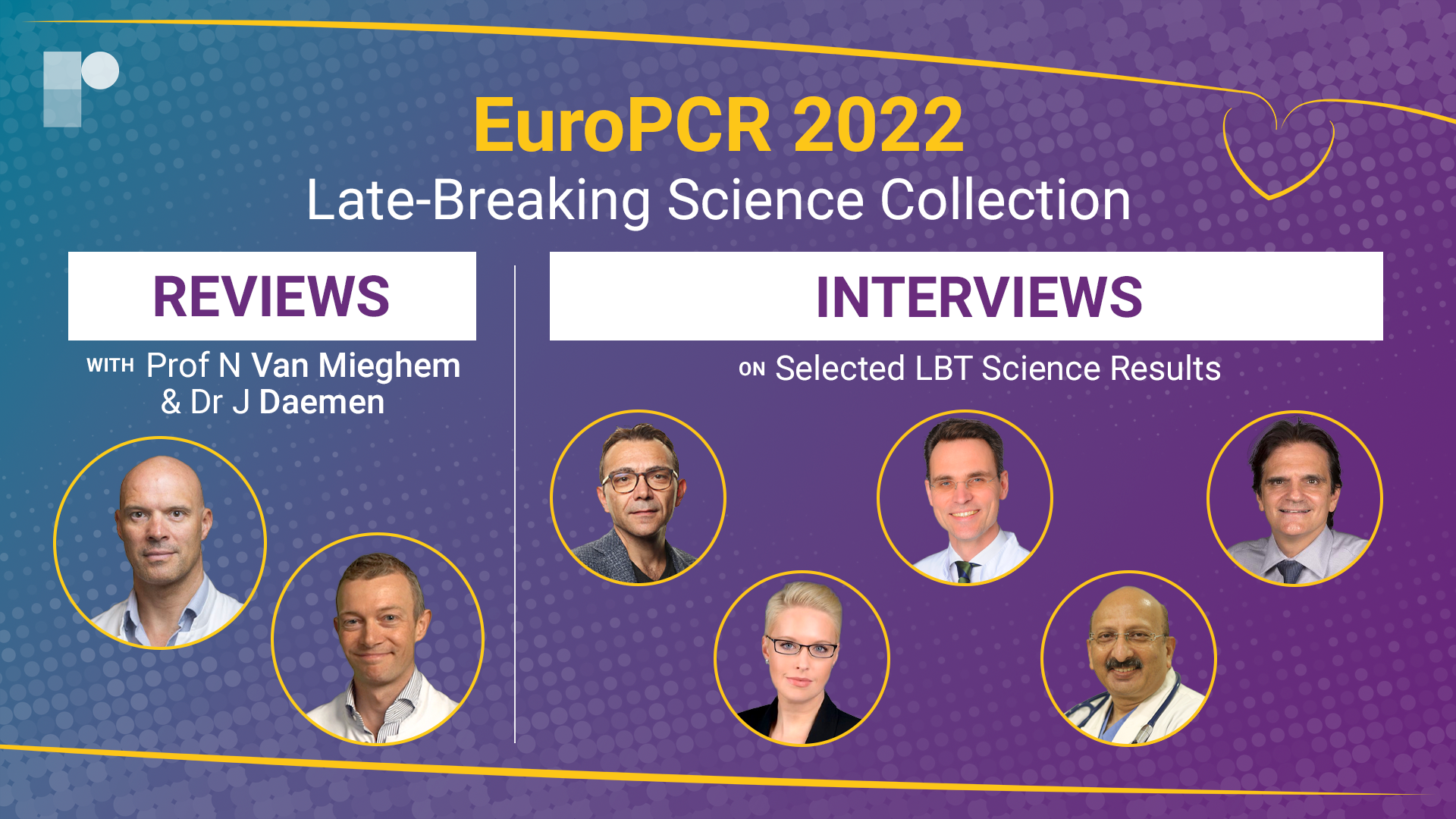EuroPCR 2022: Late-breaking Science Video Collection
Published: 13 May 2022
-
Views:
 2303
2303
-
Likes:
 7
7
-
Views:
 2303
2303
-
Likes:
 7
7
-
 Up Next
Up Next -
 7m 50s
7m 50s -
 5m 56s
5m 56s -
 3m 34sPart 2 | Session 5 EuroPCR 22: CRUZ-HBR Indicates Use Of Supraflux™ Cruz Stent Is Favourable
3m 34sPart 2 | Session 5 EuroPCR 22: CRUZ-HBR Indicates Use Of Supraflux™ Cruz Stent Is Favourable -
 4m 49s
4m 49s -
 3m 53sPart 2 | Session 7 EuroPCR 22: Short-Term Clinical Outcomes of ACURATE neo2™
3m 53sPart 2 | Session 7 EuroPCR 22: Short-Term Clinical Outcomes of ACURATE neo2™ -
 4m 20s
4m 20s -
 2m 18sPart 2 | Session 9 EuroPCR 22: SYNERGY™ Non-inferior to BioMatrix NeoFlex in OCT SORT-OUT VIII
2m 18sPart 2 | Session 9 EuroPCR 22: SYNERGY™ Non-inferior to BioMatrix NeoFlex in OCT SORT-OUT VIII -
 5m 9s
5m 9s -
 7m 18sPart 2 | Session 11 EuroPCR 22: Balloon Vs Self-Expanding Valves in Valve-in-Valve TAVI
7m 18sPart 2 | Session 11 EuroPCR 22: Balloon Vs Self-Expanding Valves in Valve-in-Valve TAVI -
 5m 52sPart 2 | Session 12 EuroPCR 22: MitraClip in Atrial Functional Mitral Regurgitation
5m 52sPart 2 | Session 12 EuroPCR 22: MitraClip in Atrial Functional Mitral Regurgitation -
 2m 15sPart 2 | Session 13 EuroPCR 22: SCB with Micro-Reservoir Technology in Coronary Lesions
2m 15sPart 2 | Session 13 EuroPCR 22: SCB with Micro-Reservoir Technology in Coronary Lesions -
 4m 46sPart 2 | Session 14 EuroPCR 22: FORWARD PRO Study Shows No Durability Issues After 3 Years
4m 46sPart 2 | Session 14 EuroPCR 22: FORWARD PRO Study Shows No Durability Issues After 3 Years -
 4m 25sPart 2 | Session 15 EuroPCR 22: DEB & DES in the Treatment of Diffuse CAD
4m 25sPart 2 | Session 15 EuroPCR 22: DEB & DES in the Treatment of Diffuse CAD -
 3m 16sPart 2 | Session 16 EuroPCR 22: EASTBOURNE Registry indicates Satefy of Sirolimus-Coated Balloon
3m 16sPart 2 | Session 16 EuroPCR 22: EASTBOURNE Registry indicates Satefy of Sirolimus-Coated Balloon -
 4m 27sPart 2 | Session 17 EuroPCR 22: JenaValve TAVR System for the Treatment of Aortic Regurgitation
4m 27sPart 2 | Session 17 EuroPCR 22: JenaValve TAVR System for the Treatment of Aortic Regurgitation -
 7m 7sPart 2 | Session 18 EuroPCR 22: Transcatheter Tricuspid Valve Repair with PASCAL System
7m 7sPart 2 | Session 18 EuroPCR 22: Transcatheter Tricuspid Valve Repair with PASCAL System -
 6m 53s
6m 53s
-
 20m 24sPart 1 | Session 1 EuroPCR 22 Late-breaking Science Preview Joost Daemen, Nicolas M Van Mieghem
20m 24sPart 1 | Session 1 EuroPCR 22 Late-breaking Science Preview Joost Daemen, Nicolas M Van Mieghem
-
 27m 14sPart 1 | Session 2 EuroPCR 22 Late-breaking Science Wrap-Up Nicolas M Van Mieghem, Joost Daemen
27m 14sPart 1 | Session 2 EuroPCR 22 Late-breaking Science Wrap-Up Nicolas M Van Mieghem, Joost Daemen
-
 3m 28sPart 2 | Session 1 EuroPCR 22: AQVA Study Shows Superiority in QFR-Based Virtual PCI Arm Simone Biscaglia
3m 28sPart 2 | Session 1 EuroPCR 22: AQVA Study Shows Superiority in QFR-Based Virtual PCI Arm Simone Biscaglia
Overview
Our regular review series View from the Thoraxcenter hosted by Prof Nicolas Van Mieghem and Dr Joost Daemen (Thoraxcentre, Erasmus MC, Rotterdam, NL) provide a concise analysis of the late-breaking science trials and spotlight questions that could change treatment strategies in interventional cardiology.
Short, accessible Expert Interviews will be available with select faculty focusing on the results, applicability, and impact on future research.
More from this programme
Part 1
View from the Thoraxcenter
Part 2
Expert Interviews
Faculty Biographies

Ajay J Kirtane
Professor of Clinical Medicine
Ajay J Kirtane, is Professor of Medicine at the Columbia University Medical Center (CUMC) and Director of the Cardiac Catheterization Laboratories at NewYork-Presbyterian (NYP) Hospital / CUMC. Dr. Kirtane is an internationally-renowned leader in Interventional Cardiology, specializing in the care of patients with complex coronary and peripheral vascular disease.
In addition to his clinical commitments, Ajay has a strong interest in clinical education and research, serving as Chief Academic Officer of Columbia Interventional Cardiovascular Care. He is a director of the Cardiovascular Research Foundation’s Transcatheter Cardiovascular Therapeutics conference, has served as a director of several international, national, and regional educational conferences, and has participated on the program committees for the scientific sessions of both the American College of Cardiology and American Heart Association. Ajay’s research…
Transcript
Study Background
I think there's been a lot of excitement about renal denervation and the idea that renal denervation could potentially reduce blood pressure. We conducted two independent randomised controlled trials of renal denervation versus a sham control. And we sought to pool the results together today to be able to determine if we could make any general messages across both trials.
Study Design & Patient Selection Criteria
Patients for radiance-HTN solo and trio consisted of two separate cohorts of patients. All patients did have to have elevated blood pressure but at least in the solo cohort, these were patients who could be safely taken off their medications for a short time to determine the effect of denervation versus sham on a background of no medications. Radiance-HTN trio on the other hand, took patients that were hypertensive despite being on three or more medications. And so they were actually transitioned to a single combination therapy pill of a thiazide diuretic calcium channel blocker and an angiotensin receptor blocker. Once they were stabilised and still found to be hypertensive they could then be randomised to denervation versus sham. So what we basically sought to do is to determine if the effect of denervation versus sham was consistent without heterogeneity across those two independently derived patient populations.
Key Results
The key results of this analysis, and remember these were patients who were kept on fixed medical regimens or no medicines for the solo cohort for one month and then randomly assigned to denervation versus sham followed for an additional two months to determine the true treatment effect of the therapy. Between two and six months, medications were added back to their regimens in order to achieve better levels of blood pressure control. What we showed is that at two months, there was a clear drop in blood pressure in both study groups, denervation arm relative to sham, and at six months less medications needed to be added back to those patients who were randomly assigned to the denervation group. Notably though, despite less medicines being added back, blood pressures were lower at six months across the entire study period in the denervation group compared to the sham group. In fact, from baseline to six months in the denervation group, blood pressure dropped by 13 millimetres of mercury. For these patients that had started off at blood pressures of 150 and above, that's a meaningful difference. But that's really a combined effect of denervation plus medications. When you compare it to sham plus medications, the difference in daytime ambulatory systolic blood pressure and home systolic blood pressure was approximately five millimetres of mercury but yet this was highly significant when pooled across both populations. So in summary, what we showed is that the treatment effect was very similar in both studies, despite differing levels of hypertension. And despite the fact that this was on meds and off meds. And so in a sense, renal denervation would work similarly independent of the severity of hypertension and independently of medicines being added or not.
Which Patients Would Benefit from RDN and Considerations
Well, because it's an invasive procedure, you have to be cautious about whom you offer renal denervation to. And so in general, we know medicines and lifestyle modification work very well. And so these were really going to be patients who despite medicines and lifestyle can't tolerate further additions and still remain uncontrolled. For those patients, renal denervation seems to be a quite an attractive alternative. We do have to make sure that long term safety data is holding up and showing there are no deleterious effects of the procedure, but to date that doesn't seem to be an issue. And so my sense is that for patients that have difficult to control blood pressure or those who are unable to tolerate medications, this might offer a good alternative.
Take-Home Messages
To me, the take home messages are really important, especially because today is World Hypertension Day. We know that blood pressure is difficult to control and there are many patients that have poorly controlled blood pressure. Renal denervation through several sham controlled studies has been shown to effectively lower blood pressure. And therefore that offers a complimentary addition to what we already have today to treat our patients. So for patients whose blood pressure is difficult to control or have challenges taking medicines, this is an important adjunct that will likely be approved in the next few years and giving our physicians an additional option to treat blood pressure.
Next Steps
The key next steps for these devices are several. I think first, we need longer term safety data from all programmes and that's ongoing. Second, we need the pivotal approval trials to be completed and we hope that will happen in the next year. And then ultimately these devices will then be approved certainly in the United States and then perhaps abroad. Finally, we'll need better treatment pathways to determine exactly where in the pathway or the patient journey renal denervation can be offered. Because again, just because you have something that potentially works, doesn't mean it should be first line. I still personally think that lifestyle modification and medications might be first line for these patients. But yet, at some point renal denervation should be considered and potentially offered to help control blood pressure better.





